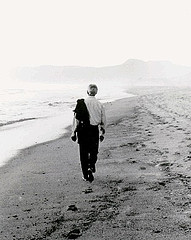- Fear
- Love
- Hate
-
Laziness
- Security
- Violence
- Suffering
- Creativity
- Education
-
Loneliness
- Discontent
- Relationship
- Work of Man
- Responsibility
- Self Deception
- Transformation
- Medicore people
- Purpose of Living
- Issue of
Marriage
- On Helping
Others
- J Krishnamurti Jokes
- J Krishnamurti Quotes
- Self Centered Activity
- J Krishnamurti on Hope
-
Core of Jiddu Teachings
- Meditation
Experiences
-
Can a Woman live Alone
- Krishnamurti talk on God
- Krishnamurti on Meditation
- Krishnamurti on Loneliness
More Jiddu Krishnamurti Talks
- J Krishnamurti
Books
-
J Krishnamurti
Teachings
-
J Krishnamurti Meditations
-
Krishnamurti on Realization
-
Krishnamurti Discourses Blog
|
Question: I have listened to all your talks and I have
read all your books. Most earnestly I ask you, what can be the purpose of my
life if, as you say, all thought has to cease, all knowledge to be
suppressed, all memory lost? How do you relate that state of being, whatever
it may be according to you, to the world in which we live? What relation has
such a being to our sad and painful existence?
Jiddu Krishnamurti : We want to know what this state is which can
only be when all knowledge, when the recognizer, is not; we want to know
what relationship this state has to our world of daily activity, daily
pursuits. We know what our life is now - sad, painful, constantly fearful,
nothing permanent; we know that very well. We want to know what relationship
this other state has to that - and if we put aside knowledge, become free
from our memories and so on, what is the purpose of existence.
What is the purpose of existence as we know it now? - not
theoretically but actually? What is the purpose of our everyday existence?
just to survive, isn't it? - with all its misery, with all its sorrow and
confusion, wars, destruction and so on. We can invent theories, we can say:
''This should not be, but something else should be.''
But those are all
theories, they are not facts. What we know is confusion, pain, suffering,
endless antagonisms. We know also, if we are at all aware, how these come
about. The purpose of life, from moment to moment, every day, is to destroy
each other, to exploit each other, either as individuals or as collective
human beings.
In our loneliness, in our misery, we try to use others, we try
to escape from ourselves - through amusements, through gods, through
knowledge, through every form of belief, through identification. That is our
purpose, conscious or unconscious, as we now live. Is there a deeper, wider
purpose beyond, a purpose that is not of confusion, of acquisition? Has that
effortless state any relation to our daily life ?
Certainly that has no relation at all to our life. How can
it have? If my mind is confused, agonized, lonely, how can that be related
to something which is not of itself? How can truth be related to falsehood,
to illusion? We do not want to admit that, because our hope, our confusion,
makes us believe in something greater, nobler, which we say is related to
us. In our despair we seek truth, hoping that in the discovery of it our
despair will disappear.
So we can see that a confused mind, a mind ridden with
sorrow, a mind that is aware of its own emptiness, loneliness, can never
find that which is beyond itself. That which is beyond the mind can only
come into being when the causes of confusion, misery, are dispelled or
understood. All that I have been saying, talking about, is how to understand
ourselves, for without self-knowledge the other is not, the other is only an
illusion.
If we can understand the total process of ourselves, from
moment to moment, then we shall see that in clearing up our own confusion,
the other comes into being. Then experiencing that will have a relation to
this. But this will never have a relation to that. Being this side of the
curtain, being in darkness, how can one have experience of light, of
freedom? But when once there is the experience of truth, then you can relate
it to this world in which we live.
If we have never known what love is, but only constant
wrangles, misery, conflicts, how can we experience that love which is not of
all this? But when once we have experienced that, then we do not have to
bother to find out the relationship. Then love, intelligence, functions. But
to experience that state, all knowledge, accumulated memories,
self-identified activities, must cease, so that the mind is incapable of any
projected sensations. Then, experiencing that, there is action in this
world.
Surely that is the purpose of existence - to go beyond the
self-centred activity of the mind. Having experienced that state, which is
not measurable by the mind, then the very experiencing of that brings about
an inward revolution. Then, if there is love, there is no social problem.
There is no problem of any kind when there is love. 'Because we do not know
how to love we have social problems and systems of philosophy on how to deal
with our problems. I say these problems can never be solved by any system,
either of the left or of the right or of the middle. They can be solved -
our confusion, our misery, our self-destruction - only when we can
experience that state which is not self-projected.
Source: from book "The First and Last Freedom" by Jiddu Krishnamurti
Related Article:
Jiddu Krishnamurti on meaning and purpose of
our Living?
|

|
